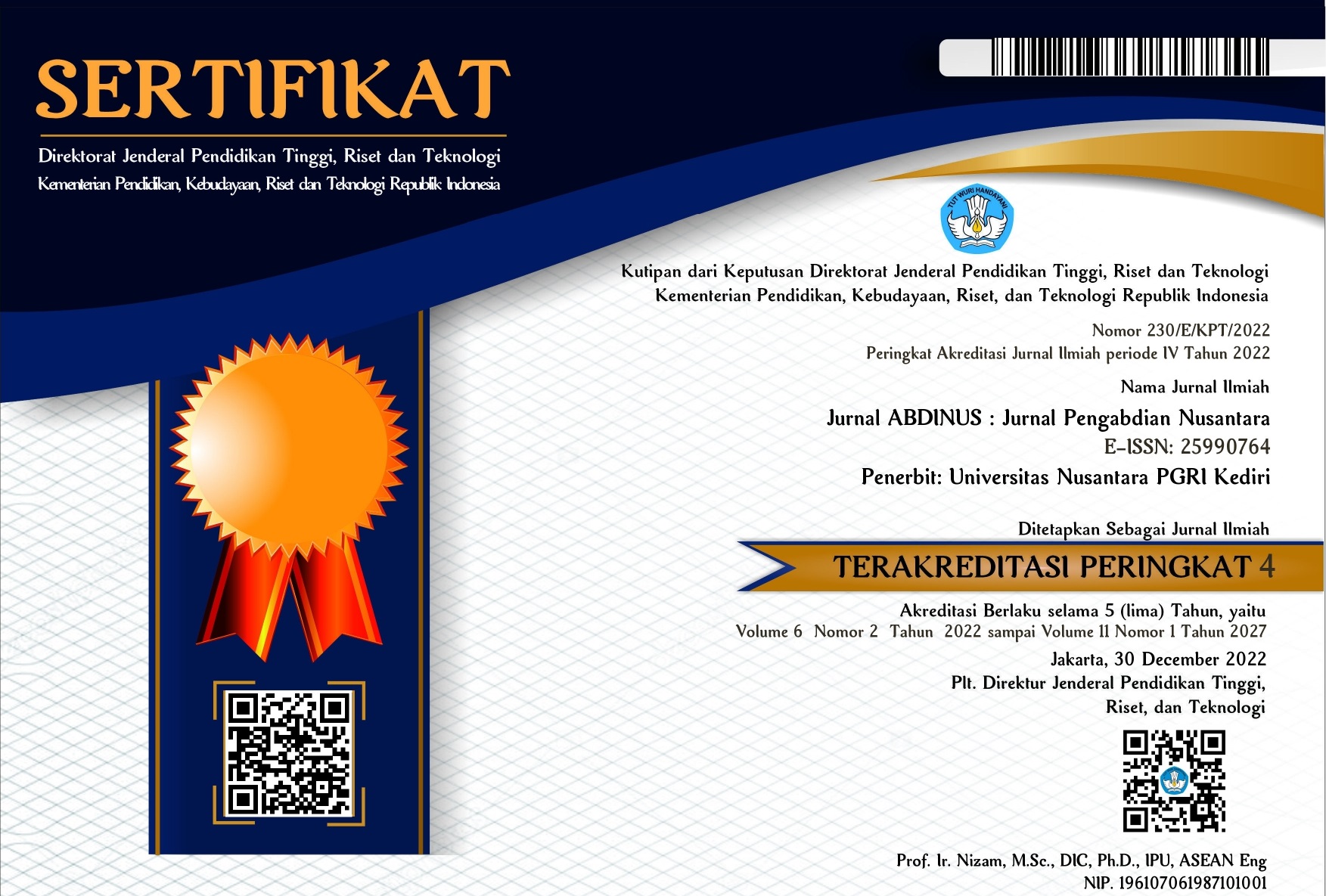Pelatihan Pembuatan Soal Kognitif Berbasis Aplikasi Android Kahoot untuk Guru Sekolah Dasar Islam Terpadu Bina Insani Kediri
DOI:
https://doi.org/10.29407/ja.v6i1.16895Keywords:
Cognitive evaluation, Kahoot app, Elementary school teacherAbstract
This activity aims to provide training to teachers and practice problem making and implementation in elementary schools. So that teachers get direct experience in making problems through the Kahoot application for teachers. The method of carrying out this activity is carried out from the preparation stage to the reporting of activities that take about 1 month. Parties involved in the activity include: 1). Lecturers as speakers and moderators, students as a support team for the implementation of the event. 2). Teachers in SDIT Bina Insani Kediri. Of the 25 teachers who have participated in the training, as many as 17 teachers have submitted the results of the analysis, based on the results of the questionnaire showed 4 teachers stated there were no obstacles in implementing kahoot. While the other 13 stated to experience some obstacles, namely less accustomed to operating kahoot. The advantages of applications when implemented include more interesting and easy to do. Kahoot application can be one of the alternative learning variations. Through the use of kahoot learning outcomes related to the order of the level of truth problems can be more quickly known. Kahoot application is practical, because teachers can directly monitor students who work on problems.
Downloads
References
Bahar, H., Setiyaningsih, D., Nurmalia, L., & Astriani, L. (2020). EFEKTIFITAS KAHOOT BAGI GURU DALAM PEMBELAJARAN DI SEKOLAH DASAR. KACANEGARA Jurnal Pengabdian Pada Masyarakat, 3(2). https://doi.org/10.28989/kacanegara.v3i2.677
Fazriyah, N., Saraswati, A., Permana, J., & Indriani, R. (2020). PENGGUNAAN APLIKASI KAHOOT PADA PEMBELAJARAN MEDIA DAN SUMBER PEMBELAJARAN SD. Didaktik : Jurnal Ilmiah PGSD STKIP Subang, 6(1). https://doi.org/10.36989/didaktik.v6i1.119
Huang, R., Chen, G., Yang, J., & L. (2013). The new Shape of Learning: Adapting to Social Changes in The Information Society. (R.Huang &J.M Spector (ed.)). Springer. https://doi.org/https://doi.org/10.1007/978-3-642-32301-0_1
Huang, R. H., Liu, D. J., Tlili, A., Yang, J. F., & Wang, H. H. (2020). Handbook on facilitating flexible learning during educational disruption: The Chinese experience in maintaining undisrupted learning in COVID-19 Outbreak. In Smart Learning Institute of Beijing Normal University UNESCO.
Nguyen, T. T. T., & Yukawa, T. (2019). Kahoot with smartphones in testing and assessment of language teaching and learning, the need of training on mobile devices for vietnamese teachers and students. International Journal of Information and Education Technology, 9(4). https://doi.org/10.18178/ijiet.2019.9.4.1214
Owen, H. E., & Licorish, S. A. (2020). Game-based student response system: The effectiveness of Kahoot! On junior and senior information science students’ learning. Journal of Information Technology Education: Research, 19. https://doi.org/10.28945/4608
Permana, E. P. (2018). Efektifitas Model Creative Problem Solving Dengan Media Teka-Teki Silang Daun Terhadap Aktivitas dan Hasil Belajar IPA Sekolah Dasar. JRPD (Jurnal Riset Pendidikan Dasar), 1(2). https://doi.org/10.26618/jrpd.v1i2.1441
Saidah, K. (2017). Implementasi Pendidikan Karakter melalui Pengenalan Nilai-Nilai Kearifan Lokal di SDN Burengan 2 Kota Kediri. Journal of Chemical Information and Modeling. https://doi.org/10.1017/CBO9781107415324.004
Tóth, Á., Lógó, P., & Lógó, E. (2019). The effect of the kahoot quiz on the student’s results in the exam. Periodica Polytechnica Social and Management Sciences, 27(2). https://doi.org/10.3311/PPso.12464
Wang, A. I., & Tahir, R. (2020). The effect of using Kahoot! for learning – A literature review. Computers and Education, 149. https://doi.org/10.1016/j.compedu.2020.103818















